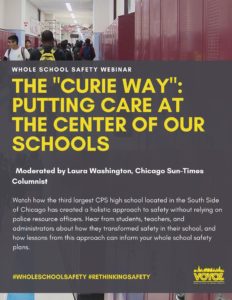The “Curie Way”: Putting Care At The Center Of Our Schools
After a decade of work to dismantle the school-to-prison pipeline, the movement to transform school safety in Chicago is at a critical moment. On June 15th, we hosted a panel discussion, inviting others to learn about the “The Curie Way,” a model for school safety transformation through a holistic approach grounded in holistic student support coupled with a focus on a behavioral health team strategy. Educators, community members, and local school council members left with actionable tools on how schools can implement similar approaches.
As we continue to work with partners and the Whole School Safety committees across the high schools that remain with SROs, there is a critical opportunity to reinvest resources away from law enforcement approaches in our schools and into healing-centered approaches. The panel discussion served as a historic opportunity for parents, students, local school council members, and community members to be involved. Stay tuned for more actions and unique opportunities to advance this critical work.
Teacher’s Guide To Building A Restorative Classroom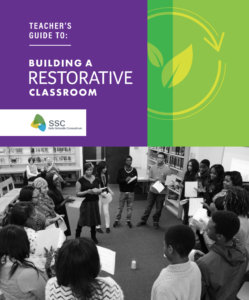
VOYCE collaborated with Alternatives, Inc. and the Chicago Teachers Union Quest Center through our Safe Schools Consortium to create this teachers guide to building a restorative classroom. A big thanks to all the amazing students and teachers that helped to create this guide!
Open Bottles, Broken Policies
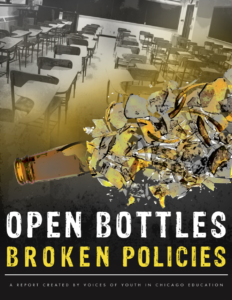 In Spring of 2018, VOYCE released a report, “Open Bottles Broken Policies” commissioned by Lurie Children’s Hospital to get to the root causes and to develop solutions to underage alcohol use. While there has been movement across Chicago and Illinois away from exclusionary discipline approaches to student misbehavior and toward more restorative approaches, alcohol abuse and other forms of substance abuse continue to carry a large stigma and are still by and large treated with punitive measures instead of addressing the root causes of the problem. This is especially true for low-income students of color in CPS. The effects of overlooking the underlying causes of alcohol abuse and continuing to rely on exclusionary discipline and law enforcement are far-reaching. The 2016 Illinois Youth Survey shows that 14,480 of the entire CPS 12th grade population and more than 5, 200 8th graders reported using alcohol in the past year. Additionally, 7, 240 CPS 12th grade students and almost 8,000 8th graders reported feeling sad or hopeless almost every day in the past two weeks. Among Illinois High School Seniors in 2016, 58% have used alcohol in the past year and 41% have used alcohol in the past 30 days. These students report that while or after drinking alcohol during the past 12 months 15, 640 have gotten into an argument or fight while almost 10,000 have been hurt of injured.
In Spring of 2018, VOYCE released a report, “Open Bottles Broken Policies” commissioned by Lurie Children’s Hospital to get to the root causes and to develop solutions to underage alcohol use. While there has been movement across Chicago and Illinois away from exclusionary discipline approaches to student misbehavior and toward more restorative approaches, alcohol abuse and other forms of substance abuse continue to carry a large stigma and are still by and large treated with punitive measures instead of addressing the root causes of the problem. This is especially true for low-income students of color in CPS. The effects of overlooking the underlying causes of alcohol abuse and continuing to rely on exclusionary discipline and law enforcement are far-reaching. The 2016 Illinois Youth Survey shows that 14,480 of the entire CPS 12th grade population and more than 5, 200 8th graders reported using alcohol in the past year. Additionally, 7, 240 CPS 12th grade students and almost 8,000 8th graders reported feeling sad or hopeless almost every day in the past two weeks. Among Illinois High School Seniors in 2016, 58% have used alcohol in the past year and 41% have used alcohol in the past 30 days. These students report that while or after drinking alcohol during the past 12 months 15, 640 have gotten into an argument or fight while almost 10,000 have been hurt of injured.
With this as a backdrop, VOYCE dug deeper into these issues through a comprehensive participatory action research process consisting of students developing their own research questions, which centered around why students drink alcohol and exploring what changes to school policy need to occur to effectively address alcohol abuse among teenagers. Students received professional training by the Institutional Review Board administered by Lurie Children’s Hospital, and developed a research process that included a literature review, surveys, and focus groups. As a final step, youth researchers also crafted solutions based on the research and data analysis. Through this process, the research only strengthened the wisdom that young people already had—that underage drinking is a glaring signal that the young person is in need of healing and not punishment. To read the report, click here
Failed Policies, Broken Futures: The True Cost of Zero Tolerance in Chicago.
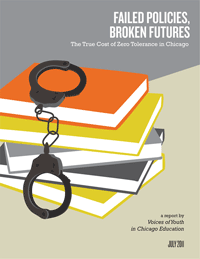 In 2011, VOYCE released our second report, “Failed Policies, Broken Futures: The True Cost of Zero Tolerance in Chicago.” This original cost-analysis report, written in partnership with the national civil rights organization Advancement Project, found that harsh discipline policies at CPS have negatively impacted school safety and student achievement, at a huge cost to taxpayers. VOYCE collected student stories, CPS budget information, and multiple research sources and concluded that harsh discipline policies are highly overused in Chicago, keeping students out of valuable learning time, decreasing students’ chances of graduating, and costing the city millions of dollars:
In 2011, VOYCE released our second report, “Failed Policies, Broken Futures: The True Cost of Zero Tolerance in Chicago.” This original cost-analysis report, written in partnership with the national civil rights organization Advancement Project, found that harsh discipline policies at CPS have negatively impacted school safety and student achievement, at a huge cost to taxpayers. VOYCE collected student stories, CPS budget information, and multiple research sources and concluded that harsh discipline policies are highly overused in Chicago, keeping students out of valuable learning time, decreasing students’ chances of graduating, and costing the city millions of dollars:
- In 2009, there were 4,597 school-based arrests of CPS students age 16 and younger. 78% were for minor offenses.
- Students who have been arrested are 50% more likely to drop out.
- Based on the cost of each lost graduate, the report predicts that CPS’s school-based arrests in 2009 alone will cost Chicago taxpayers around $240 million in long-term costs. Simply cutting the annual number of arrests in half would result in $120 million in long-term economic benefits to the city per year
The report also examined the CPS budgets and found that this zero tolerance approach has diverted funds from more effective and proven approaches to school safety, such as guidance counseling, mental health supports, and peer mentoring.
- In 2010, the budget of the Office of Safety and Security was 48 times larger than the budget of the Office of Student Support and Engagement, and 84 times larger than the budget of the Office of Teaching and Learning.
- In 2010, CPS allocated just $3.5 million towards school-based college and career coaches, and $51.4 million towards school-based security guards.
The findings from “Failed Policies, Broken Futures” are currently being used by VOYCE youth leaders and their allies to demand strong limits on harsh disciplinary actions at all CPS schools, the creation of a detailed public database on the school-level use of suspensions, expulsions, arrests and referrals, and increased investment in effective prevention and intervention strategies. You can download the full report here.
Student-Led Solutions to the Nation’s Dropout Crisis
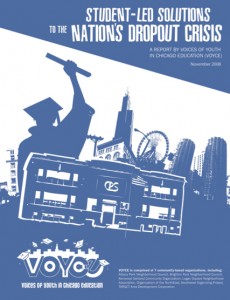 In 2008 VOYCE released, “Student-Led Solutions to the Nation’s Dropout Crisis”. All of VOYCE’s organizing work is grounded in the findings of an intensive, year-long Participatory Action Research (PAR) project on the root causes of Chicago’s 50% graduation rate, conducted when VOYCE was first launched by student leaders in 2007. Over 100 youth collected and analyzed data from 1325 student surveys, 208 student interviews, 110 teacher interviews and 65 parent interviews.
In 2008 VOYCE released, “Student-Led Solutions to the Nation’s Dropout Crisis”. All of VOYCE’s organizing work is grounded in the findings of an intensive, year-long Participatory Action Research (PAR) project on the root causes of Chicago’s 50% graduation rate, conducted when VOYCE was first launched by student leaders in 2007. Over 100 youth collected and analyzed data from 1325 student surveys, 208 student interviews, 110 teacher interviews and 65 parent interviews.
They concluded that, to raise graduation rates, CPS must support district-level policies and school-level practices that foster trusting and supportive relationships with peers and school staff, establish the sense of purpose that comes from high expectations and academic engagement, and end the use of harsh discipline policies that push students out of school and into prisons.
For more information, please contact Meyiya Coleman, VOYCE Coordinator, at meyiya@communitiesunited.org or at 773-952-9749.



